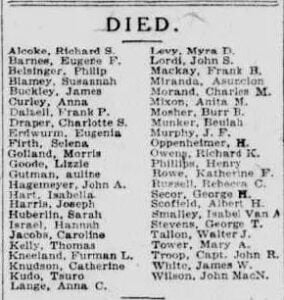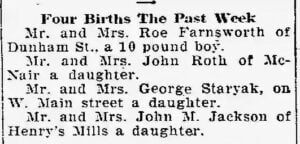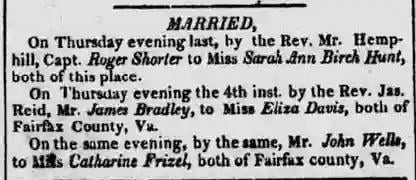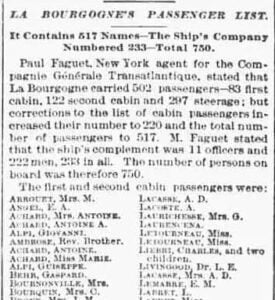The Genealogist's Checklist:
Must-Know Types of Content in Historical Newspapers
When embarking on the journey to uncover your family history, newspapers serve as an invaluable resource, brimming with information waiting to be explored. While headlines may initially catch your eye, the true treasures for genealogists are often nestled within the pages of these historical documents. From birth announcements to obituaries, newspapers provide a vast array of knowledge that can help you assemble the pieces of your family’s narrative. Newspapers offer diverse content that can prove indispensable for your family history research.
Types of Information Found in Newspapers
Newspapers are more than just a source of news; they are a reflection of the communities they served. Within their pages, you can find a wide array of information that can provide crucial details about your ancestors’ lives.
- Obituaries: Obituaries are a rich source of genealogical information, providing details about an individual’s life, family, and death. They often include the person’s full name, date and place of birth, date and place of death, cause of death, occupation, education, military service, and religious affiliations. Obituaries may also list surviving family members, such as spouses, children, siblings, and parents, as well as predeceased relatives. In some cases, they may mention the individual’s place of burial, funeral arrangements, and memorial services. Obituaries can help you identify previously unknown family members, confirm relationships, and uncover new research leads.
To learn more, check out Uncovering Family History: Your Guide to Locating Obituaries.
- Birth Announcements: Birth announcements in newspapers can provide valuable information for genealogists, especially when official birth records are difficult to find or incomplete. These announcements typically include the child’s name, date of birth, and place of birth. They may also mention the names of the parents, siblings, and grandparents. In some cases, birth announcements may include additional details, such as the family’s residence, the father’s occupation, or the mother’s maiden name. By searching for birth announcements, you can discover new additions to your family tree and confirm the parentage of your ancestors.
To learn more, check out Baby Steps to Family History: Hunting for Birth Announcements in Online Newspapers.
- Marriage Notices: Marriage notices in newspapers can offer important clues about your ancestors’ relationships and family connections. These announcements often include the names of the bride and groom, the date and location of the wedding, and the names of the officiant and witnesses. They may also mention the names of the couple’s parents, their occupations, and their places of residence. In some cases, marriage notices may provide details about the wedding ceremony, reception, and honeymoon plans. By finding marriage notices, you can confirm the unions of your ancestors and identify new branches of your family tree.
To learn more, check out Say ‘I Do’ to Genealogy: Finding Marriages in Online Newspapers.
- Military Notices: Newspapers often published military notices, which can be an excellent source of information for those researching ancestors who served in the armed forces. These notices may include enlistment announcements, promotions, transfers, casualties, and other military-related events. Enlistment notices can provide details about when and where your ancestor joined the military, as well as their unit and rank. Promotion and transfer notices can help you track your ancestor’s military career and movements. Casualty notices, including those for soldiers killed in action, wounded, or missing, can offer insights into your ancestor’s wartime experiences and sacrifices.
In addition to these specific notices, newspapers also published articles about local military units, their activities, and their participation in various conflicts. These stories may mention your ancestor by name, providing additional context about their service. After the war, newspapers often printed lists of returning veterans, as well as articles about military reunions, parades, and other events honoring local service members. These postwar mentions can help you trace your ancestor’s life after their military service ended.
To learn more, check out In the Line of Family History: Using Online Newspapers to Research Military Ancestors.
- Immigration Notices: Newspapers can help trace your immigrant ancestors’ journeys and early experiences in their new homeland. Passenger lists, sometimes published in port city newspapers, can include your ancestor’s name, age, occupation, country of origin, and arrival details. Naturalization notices, when immigrants completed the citizenship process, can provide evidence of your ancestor’s immigration status. Articles about immigrant communities can offer context about the experiences and challenges faced by immigrants in their new home.
To learn more, check out Passport to the Past: A Guide to Locating Immigration Stories in Online Newspapers.
- Local Events: Newspapers often cover local events, such as town meetings, community gatherings, school activities, and social clubs. These articles can provide valuable insights into your ancestors’ daily lives and the communities they lived in. For example, you may find mentions of your ancestors attending a church picnic, participating in a local parade, or serving on a town committee. These events can help you understand your ancestors’ interests, affiliations, and roles within their communities. They may also lead you to discover new sources of information, such as church records or club membership lists
- Legal Notices: Legal notices in newspapers can provide a wealth of information about your ancestors’ property transactions, court cases, and other legal matters. These notices may include land sales, estate settlements, probate records, divorce proceedings, and bankruptcy filings. They often contain names, dates, locations, and descriptions of the properties or legal issues involved. By searching for legal notices, you can learn about your ancestors’ financial situations, land ownership, and involvement in legal disputes. This information can help you piece together a more complete picture of your ancestors’ lives and the challenges they faced.
- Advertisements: Advertisements in newspapers can offer unique insights into your ancestors’ occupations, businesses, and economic activities. Your ancestors may have placed ads to promote their products or services, seek employment, or announce the opening of a new business. These ads can provide information about your ancestors’ skills, trades, and entrepreneurial endeavors. They may also help you identify the locations of their businesses and the types of goods or services they offered. By studying advertisements, you can gain a better understanding of your ancestors’ livelihoods and the economic landscape of their communities.
Uncovering Your Family History in Newspaper Archives
With the advent of online newspaper archives, it’s easier than ever to access historical newspapers from around the world. Websites like NewspaperArchive.com offer searchable databases of millions of newspaper pages.
To make the most of these resources, start by searching for your ancestors’ names, as well as variations of their names and any known aliases. Don’t forget to search for other family members as well, as they may be mentioned in articles about your direct ancestors.
As you browse through the newspaper pages, keep an eye out for any mention of your family, no matter how small. Even a brief mention in a local news article or advertisement can provide valuable clues for your research.
Lastly, don’t limit yourself to just the newspapers from your ancestors’ hometowns. As people moved around the country, they may have been mentioned in newspapers in their new communities as well.
Conclusion
Newspapers are a valuable resource for any genealogist looking to uncover their family history. By exploring the various types of content found within these historical records, from obituaries to local events, you can gain a deeper understanding of your ancestors’ lives and the world they lived in. So the next time you’re diving into your genealogical research, don’t forget to look beyond the headlines and discover the hidden gems waiting to be found in newspaper archives.
FAQs
What is the best way to search for my ancestors in online newspaper archives?
Start by searching for your ancestors’ names and variations of their names, as well as other family members. Look for any mention of your family, even in brief news articles or advertisements, and don’t limit your search to just their hometown newspapers.
Can newspapers help confirm family relationships?
Yes, newspapers often provide personal details and family connections that can help confirm relationships, identify new family members, and uncover additional research leads.
Need a helping hand?
Email our team at [email protected] with your questions or call us at (800) 848-0224.




